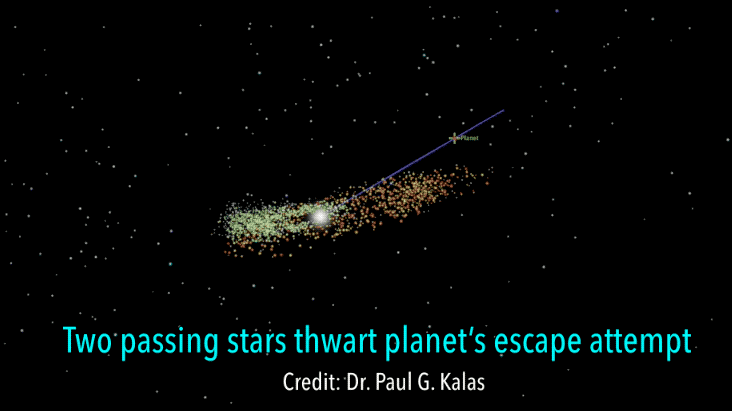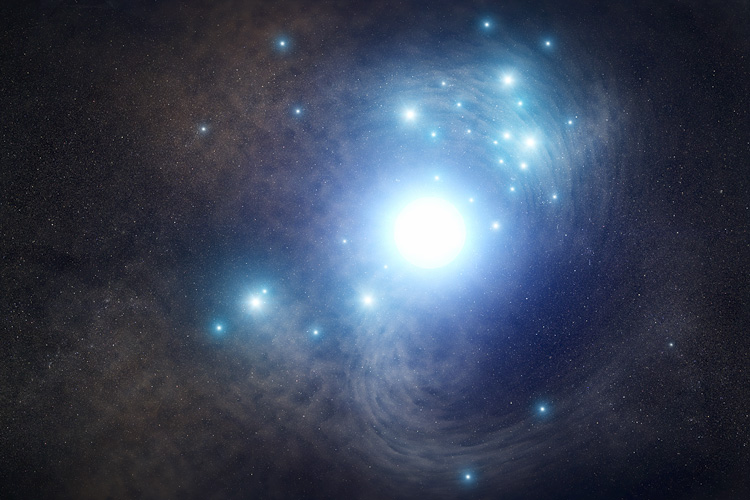-
Exiled planet linked to stellar flyby 3 million years ago
February 28, 2019
Some of the peculiar aspects of our solar system — an enveloping cloud of comets, dwarf planets in weird orbits and, if it truly exists, a possible Planet Nine far from the sun — have been linked to the close approach of another star in our system’s infancy that flung things helter-skelter. But are stellar flybys really capable of knocking planets, comets and asteroids askew, reshaping entire planetary systems? UC Berkeley and Stanford University astronomers think they have now found a smoking gun.
Tags:More -
Neptune’s newest, tiniest moon likely piece of bigger one
February 27, 2019
In the journal Nature on Wednesday, California astronomers shine a light on the 21-mile-diameter moon Hippocamp, named after the mythological sea horse. The SETI Institute's Mark Showalter discovered Neptune's 14th moon in 2013, using Hubble Space Telescope images. Showalter and his research team theorize Hippocamp was formed from debris created billions of years ago when a comet slammed into Proteus, the largest of Neptune's inner moons. The two moons orbit just 7,500 miles apart and were likely even closer in the past before Proteus migrated outward.
Tags:More -
Assistant Professor Courtney Dressing is Awarded Sloan Research Fellowship
February 20, 2019
Seven assistant professors from the fields of astronomy, biology, computer science, economics and statistics have been named 2019 Sloan Research Fellows. This year’s UC Berkeley recipients are Courtney Dressing, Shirshendu Ganguly, Moritz Hardt, Sergey Levine, Priya Moorjani, Philipp Strack and Gabriel Zucman.
Tags:More -
HIGH-ENERGY ASTROPHYSICS DIVISION ANNOUNCES 2019 AWARD WINNERS
February 12, 2019
The High-Energy Astrophysics Division (HEAD) of the American Astronomical Society has selected the winners for its top prizes for the upcoming year. The 2019 Rossi Prize has been awarded to Brian Metzger of Columbia University and Daniel Kasen of the University of California at Berkeley for their theoretical predictions of electromagnetic emission from radioactive nuclei produced in neutron star mergers. These predictions were confirmed by observations of the 2017 neutron star merger gravitational wave event, providing the first compelling evidence for the astrophysical site of rapid neutron capture nucleosynthesis. Jennifer Barnes of Columbia University has been awarded the 2019 HEAD Dissertation prize for her dissertation entitled "Radiation Transport Modeling of Kilonovae and Broad-Lined Ic Supernovae." This work also involves gravitational waves. It established the radiative signatures of mergers between two neutron stars or a neutron star and black hole, as well as the radiative signatures of jet-driven supernovae produced by collapsing massive stars. The prize includes a certificate and a $1,000 award.
Tags:More -
Young astronomer honored for research on smallest galaxies in the universe
January 8, 2019
Daniel Weisz, an assistant professor of astronomy at UC Berkeley, was honored at this week’s meeting of the American Astronomical Society for his early-career research on relatively nearby “dwarf” galaxies using the Hubble Space Telescope. He received the 2019 Newton Lacy Pierce Prize “for his transformational work on the star-formation histories of dwarf galaxies in the Local Group, our galactic neighborhood.” Weisz came to UC Berkeley in the summer of 2016 and focuses on stars, dark matter and galaxies near Earth, in particular the Local Group of galaxies that includes some 100 mostly small galaxies surrounding the two heavies, our own Milky Way and Andromeda.
More -
Tracking down a star that disappeared 65 million years ago
November 21, 2018
Astronomers may finally have tracked down the type of star that explodes with a distinctive but unusual signature: They show no evidence of hydrogen and helium, by far the most abundant elements in the universe. Such explosions have been labeled Type Ic supernovae, and make up some 20 percent of all stars that explode when their cores collapse. Most, however, have been observed at such large distances that astronomers could not pinpoint what was there before the explosion blew it to smithereens. But a team that included UC Berkeley astronomer Alex Filippenko got lucky.
Tags:More -
What magnetic fields can tell us about life on other planets
November 21, 2018
Every school kid knows that Earth has a magnetic field – it’s what makes compasses align north-south and lets us navigate the oceans. It also protects the atmosphere, and thus life, from the sun’s powerful wind. But what about other Earth-like planets in the galaxy? Do they also have magnetic fields to protect emerging life? A new analysis looks at one type of exoplanet – super-Earths up to five times the size of our own planet – and concludes that they probably do have a magnetic field, but one generated in a totally novel way: by the planets’ magma oceans.
More -
Classes cancelled 11/16
November 15, 2018
Dear Campus Community, I am writing to update you on the latest air quality readings, decisions regarding tomorrow’s class schedule, and the status of Saturday’s Big Game. As noted in previous messages, we have been closely tracking current air quality data, as well as forecasts for Berkeley. As of 3pm today the reading for the closest monitor, located in Aquatic Park, indicates that the Air Quality Index (AQI) surpassed 200, the level at which our guidelines require consideration of class cancellations. In addition, the forecast for tomorrow from the Bay Area Air Quality Management District now indicates that conditions are expected to deteriorate. In that context, and based on the guidance of experts on campus, we must assume that the 200 AQI threshold will be exceeded tomorrow. As a result, we have decided to cancel all classes for the remainder of the day today, and on Friday. While the campus is now essentially closed, there are a limited number of campus operations that must continue. They include University Health Services, dining halls and residential facilities, the optometry clinic, UCPD, OLAC, and the Office of Environment, Health & Safety. This is not a comprehensive list. Staff members who are uncertain about whether their duties can be filled from home, or have other questions should consult with their supervisors.
More -
UC Berkeley graduate student awarded Department of Energy fellowship
September 14, 2018
James Sullivan, a doctoral candidate at the University of California, Berkeley, has been awarded a Department of Energy Computational Science Graduate Fellowship (DOE CSGF) to support his research into Astrophysics. Sullivan, from McLean, VA, has bachelor’s degrees in Astronomy, Mathematics, and Physics from the University of Texas at Austin. Fewer than 6 percent of applicants are chosen for the fellowship each year.
More -
AI helps track down mysterious cosmic radio bursts
September 10, 2018
Artificial intelligence is invading many fields, most recently astronomy and the search for intelligent life in the universe, or SETI. Researchers at Breakthrough Listen, a SETI project led by the University of California, Berkeley, have now used machine learning to discover 72 new fast radio bursts from a mysterious source some 3 billion light years from Earth.
More









